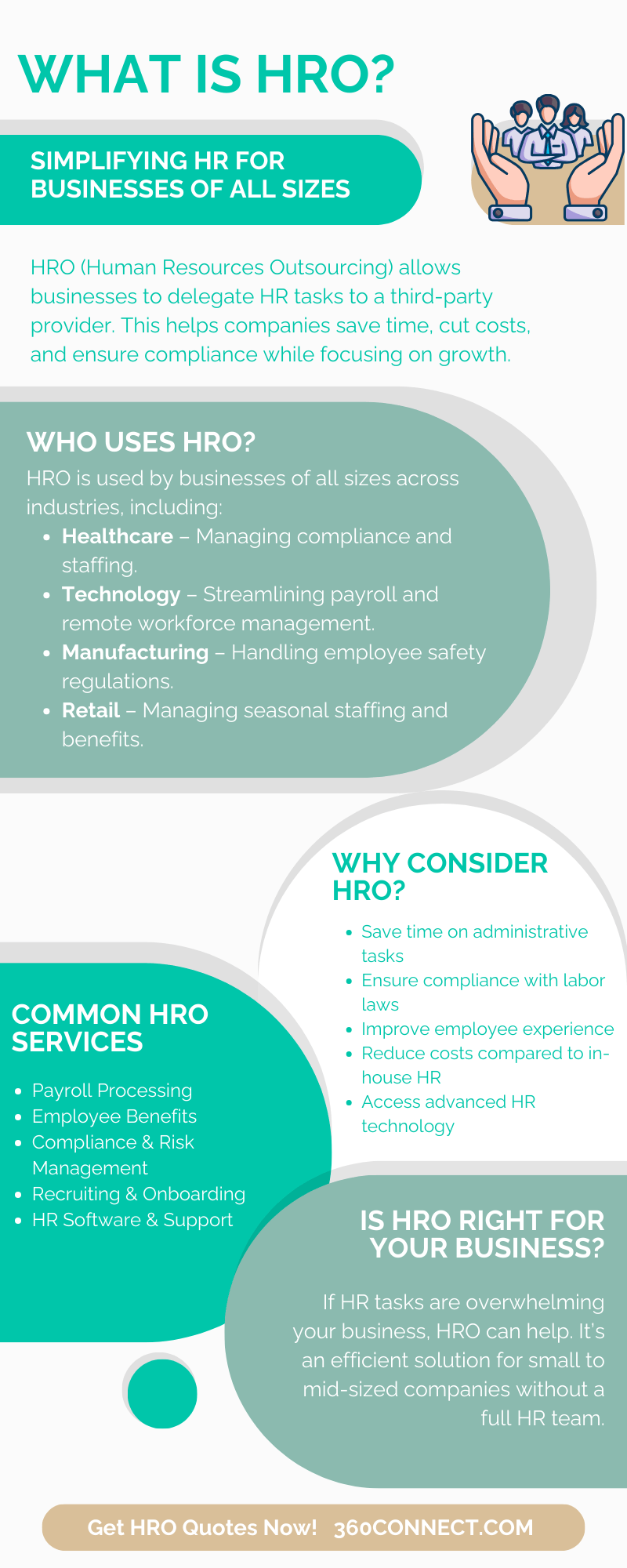If you’re a business owner looking for ways to streamline HR processes, reduce administrative burdens, and improve employee management, you may have come across the term HRO. But what exactly does it mean, and how can it benefit your business?
HRO, or Human Resources Outsourcing, is a service that allows businesses to delegate their HR functions to an external provider. This means that instead of handling everything in-house—from payroll to employee benefits—companies can rely on specialized experts to take care of these essential tasks. In this guide, we’ll break down everything you need to know about HRO in a simple, easy-to-understand way.
Related: What is Full-Service HR Outsourcing?
What is HRO?
HRO stands for Human Resources Outsourcing, a business strategy where companies contract out some or all of their HR functions to a third-party provider. This allows businesses to focus on their core operations while leaving HR tasks in the hands of professionals.
HRO providers offer customized solutions to fit a company’s needs. Whether a business requires help with payroll, employee benefits administration, compliance, or training, an HRO can handle it efficiently. By leveraging industry expertise and technology, HRO services help businesses save time and reduce errors in HR management.
Many businesses, from small startups to large corporations, turn to HRO to gain access to top-tier HR services without the need for an in-house department. This outsourcing model ensures compliance with labor laws, improves employee satisfaction, and allows businesses to operate smoothly.

Who Uses HRO?
HRO services are widely used across different industries, especially those looking to optimize HR management without expanding their internal teams. Businesses of all sizes can benefit from outsourcing HR, but it’s particularly valuable for small to mid-sized companies that don’t have the resources to maintain a full HR department.
Industries that frequently use HRO include:
- Healthcare – Managing employee benefits, compliance, and staffing needs.
- Technology – Streamlining payroll and handling remote workforce management.
- Manufacturing – Managing compliance with safety regulations and workforce training.
- Retail – Handling seasonal staffing needs and benefits administration.
- Finance & Banking – Ensuring compliance with industry regulations and employment laws.
Related: 6 Best HR Outsourcing Services for Small Businesses
Why Should Businesses Consider Using HRO?
Businesses turn to HRO services for many reasons, but one of the biggest benefits is the ability to offload time-consuming administrative tasks. Instead of dealing with payroll, tax filings, and employee benefits, companies can focus on what they do best—growing their business.
Some common reasons businesses use HRO include:
- Cost Savings – Outsourcing HR functions reduces the need for a large in-house HR staff, cutting operational costs.
- Compliance Support – HRO providers stay updated with employment laws and regulations, reducing the risk of legal issues.
- Improved Employee Experience – Professional HR services ensure employees receive timely support with payroll, benefits, and onboarding.
- Scalability – As businesses grow, HRO services can scale alongside them, ensuring HR operations remain smooth.
- Technology Access – Many HRO providers offer advanced HR software, improving efficiency and data management.
What Services Does HRO Offer?
HRO providers offer a variety of services, allowing businesses to pick and choose what they need. Some companies outsource all HR functions, while others only outsource select areas.
Common services offered by HRO include:
- Payroll Processing – Handling salary payments, tax withholdings, and direct deposits.
- Employee Benefits Management – Managing health insurance, retirement plans, and paid leave.
- Compliance & Risk Management – Ensuring adherence to labor laws and regulations.
- Recruiting & Onboarding – Assisting with hiring, training, and integrating new employees.
- Among the most commonly outsourced HR functions are employee training initiatives (58%) and recruitment (38%)
- Related: How to Hire Employees Fast
- HR Software & Reporting – Providing access to HR management systems and analytics.
What are the Benefits of Using HRO?
Outsourcing HR comes with many benefits. Here are the top five:
- Time Savings – Businesses no longer have to worry about handling HR paperwork and administrative tasks, allowing them to focus on growth.
- Expertise & Compliance – HRO providers ensure businesses follow labor laws, reducing legal risks.
- Cost Efficiency – Maintaining an in-house HR team is expensive; outsourcing helps cut costs while maintaining quality.
- Better Employee Support – Employees get quick access to HR professionals for benefits, payroll, and HR concerns.
- Scalability – HRO services grow with your business, ensuring seamless HR support at every stage.
Related: Top 9 Benefits of Outsourcing HR Services
Pros & Cons
Like any business solution, HRO has its advantages and disadvantages.
Pros:
- Reduced HR workload
- Cost-effective alternative to in-house HR
- Access to HR expertise and technology
- Compliance assurance
- Scalable for business growth
Cons:
- Less direct control over HR operations
- May not be ideal for highly customized HR needs
- Potential reliance on a third-party provider
How Much Does HRO Cost?
The cost of HRO services varies depending on the size of the business, the services required, and the provider. Some providers charge a flat monthly fee, while others use a per-employee pricing model.
Is HRO Right for Your Business?
If your business struggles with HR tasks or lacks a dedicated HR department, outsourcing might be the perfect solution. HRO allows companies to access professional HR services at a fraction of the cost of an in-house team.
For example, a small tech startup with 20 employees may not have the budget to hire an HR manager. By using an HRO provider, they can manage payroll, benefits, and compliance efficiently without hiring extra staff.
How to Choose an HRO Provider?
Finding the right HRO provider is crucial for getting the best results. Here’s what to look for:
- Industry Experience – Choose a provider with experience in your business sector.
- Service Flexibility – Look for customizable plans that fit your specific needs.
- Technology & Support – Ensure they offer HR software and responsive customer service.
- Transparent Pricing – Understand the cost structure to avoid hidden fees.
Final Thoughts
HRO is a powerful solution for businesses looking to simplify HR processes, reduce costs, and stay compliant. Whether you’re a startup or an established company, outsourcing HR can help you focus on growth while ensuring your employees are well taken care of.
Get HRO Quotes Now!
Why spend hours researching HRO providers when you can get the best options in one place? 360Connect makes it easy to compare HRO services by connecting you with up to 5 suppliers—completely free!
- Get quotes quickly
- Compare multiple providers in one place
- Save time and money on HR solutions
Start simplifying your HR today—get your free quotes now!

